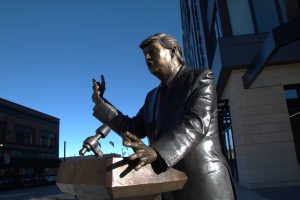RAPID CITY, S.D. — First responders in Rapid City are asking the community to look at homelessness with both compassion and clarity.
Amy Rose sat down with Brendyn Medina of the Rapid City Police Department, Lt. Tim Doyle, and Ryan Marks, Mobile Integrated Section Chief for the Rapid City Fire Department, on the Citizen’s Arrest podcast. Together, they spoke openly about the challenges of helping those living on the streets and the resources that can change lives when people are ready.
Doyle explained that homelessness is not only about housing. Many of the most visible struggles in Rapid City are tied to alcohol addiction. He said some individuals are taken to detox hundreds of times in a year, and officers often pick up the same person multiple times in a single day. “We’re not criminalizing homelessness,” Doyle said. “We’re getting them someplace safe.”
Marks described the Mobile Medic program, which sends trained paramedics to people in need before situations turn into medical emergencies. Working alongside the police department’s Quality of Life Unit and groups like Journey On, the goal is to step in early, connect people to care, and keep them safe. “It’s about getting the right resource to the right person at the right time,” Marks said.
The three leaders also spoke about the role of the community. They said giving money or alcohol to someone on the street may feel kind in the moment, but it often fuels addiction and makes recovery harder. Instead, they encouraged people to give to organizations such as Journey On and the Rapid City Area Community Foundation. Those groups provide food, shelter, treatment, and transportation to people who are ready to take steps toward change.
Since 2019, more than 8,000 potential arrests have been diverted from jail to detox. While the need continues to grow, all three agreed that progress is possible when the community works together.
For Medina, Doyle, and Marks, the message is simple but urgent. Every person on the streets is someone’s child, sibling, or parent. Many are caught in a painful cycle that can only be broken when the community comes together with compassion and accountability. By choosing to support organizations that offer real help, residents can play a part in saving lives, reducing violence, and giving people a chance at a better tomorrow. “This is not just a police or fire department issue,” Medina said. “It’s a community issue, and it will take all of us to make a difference.”





